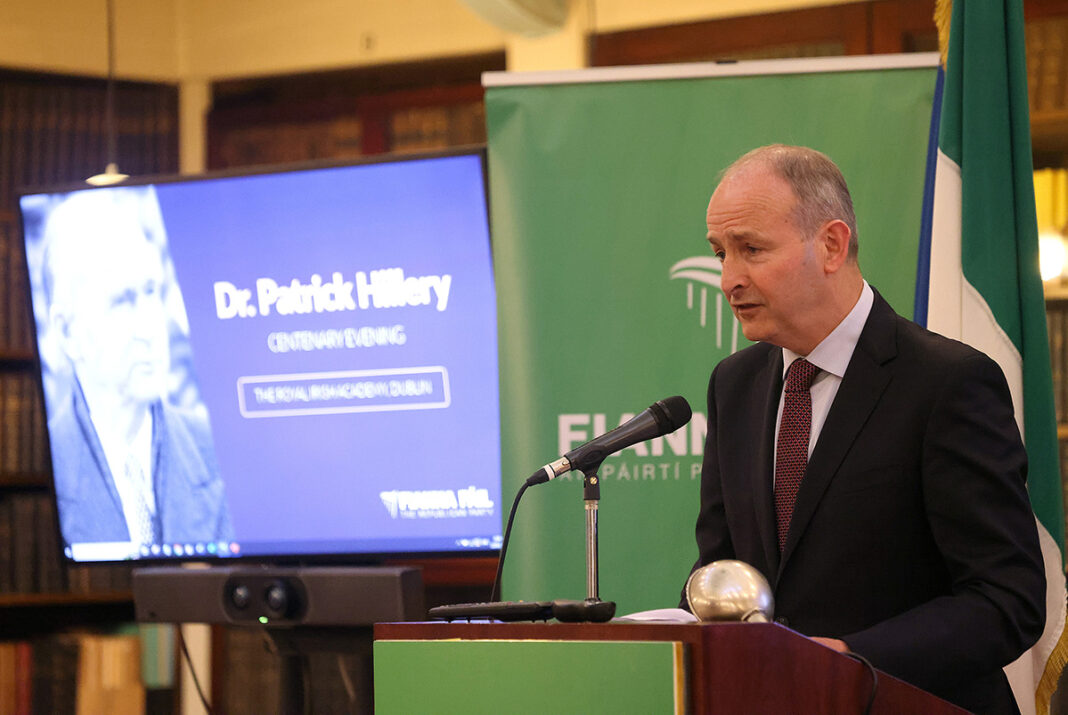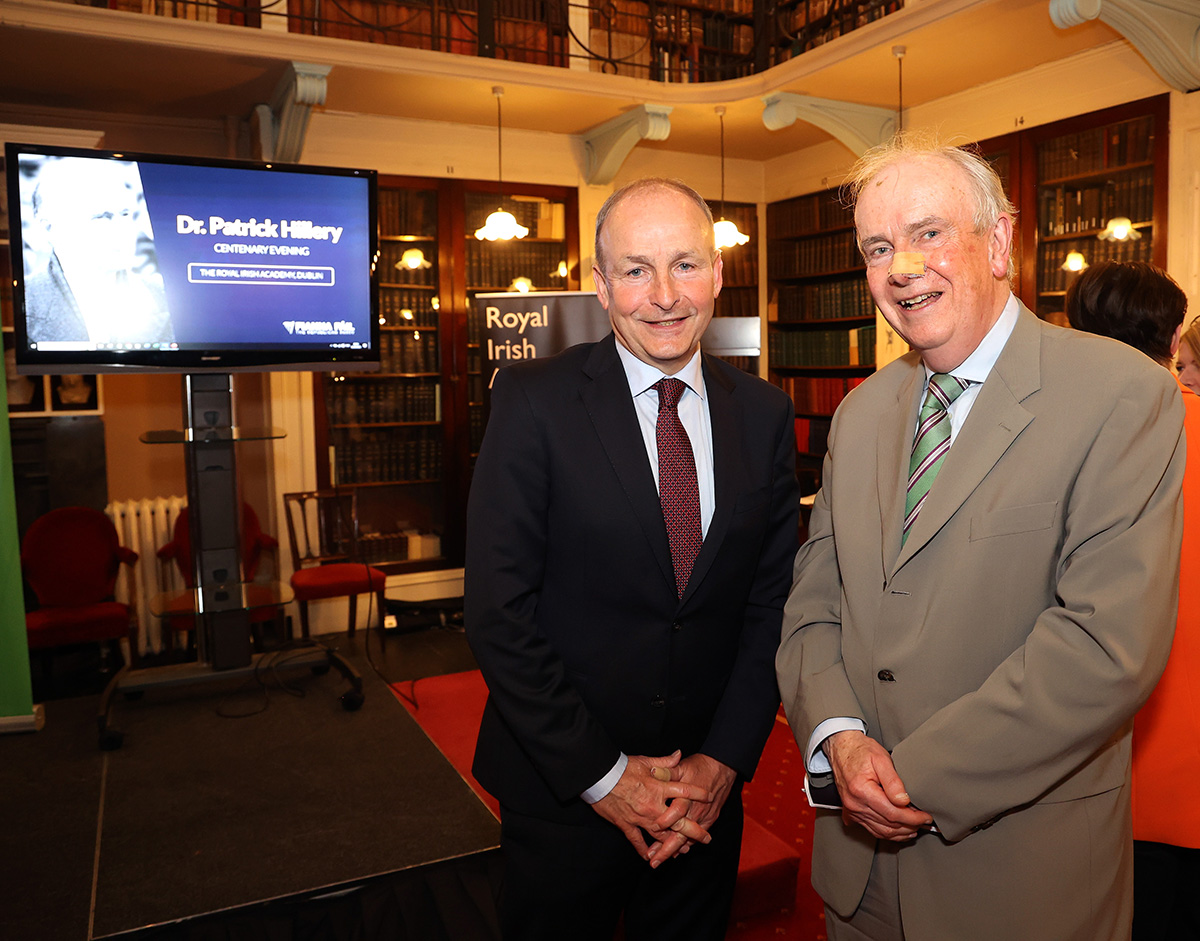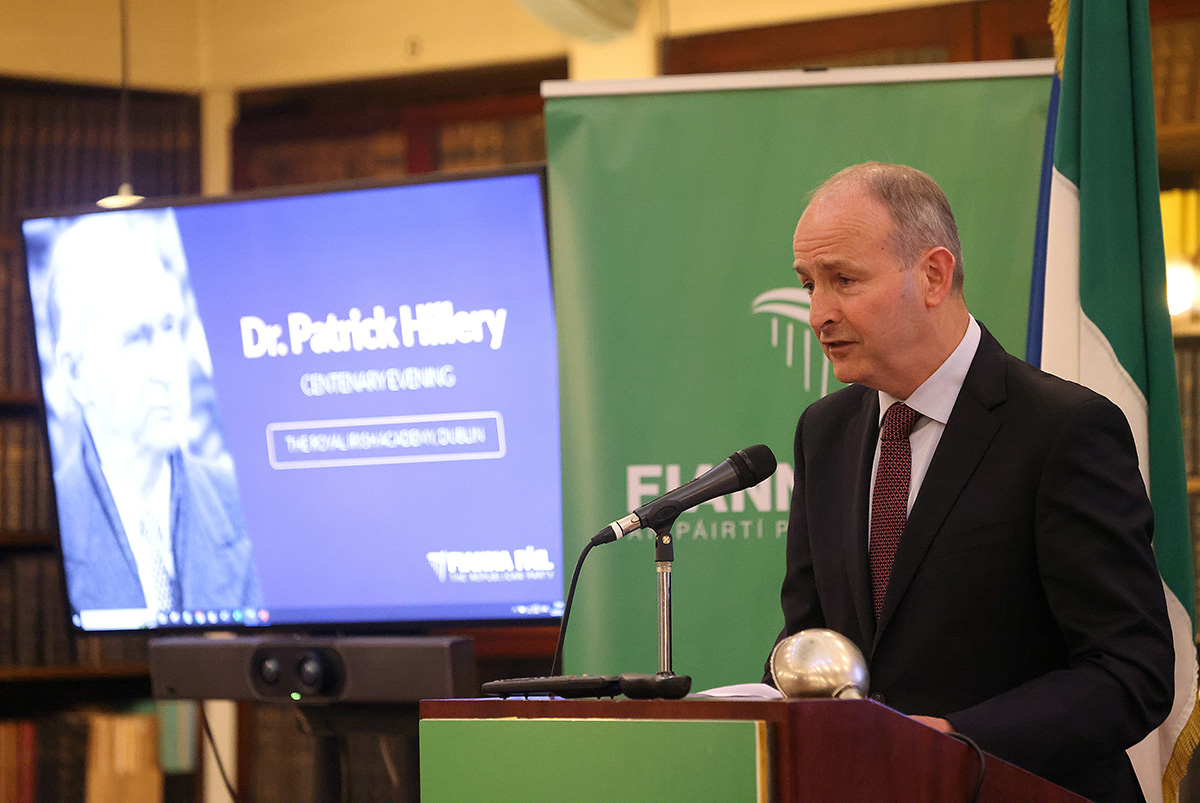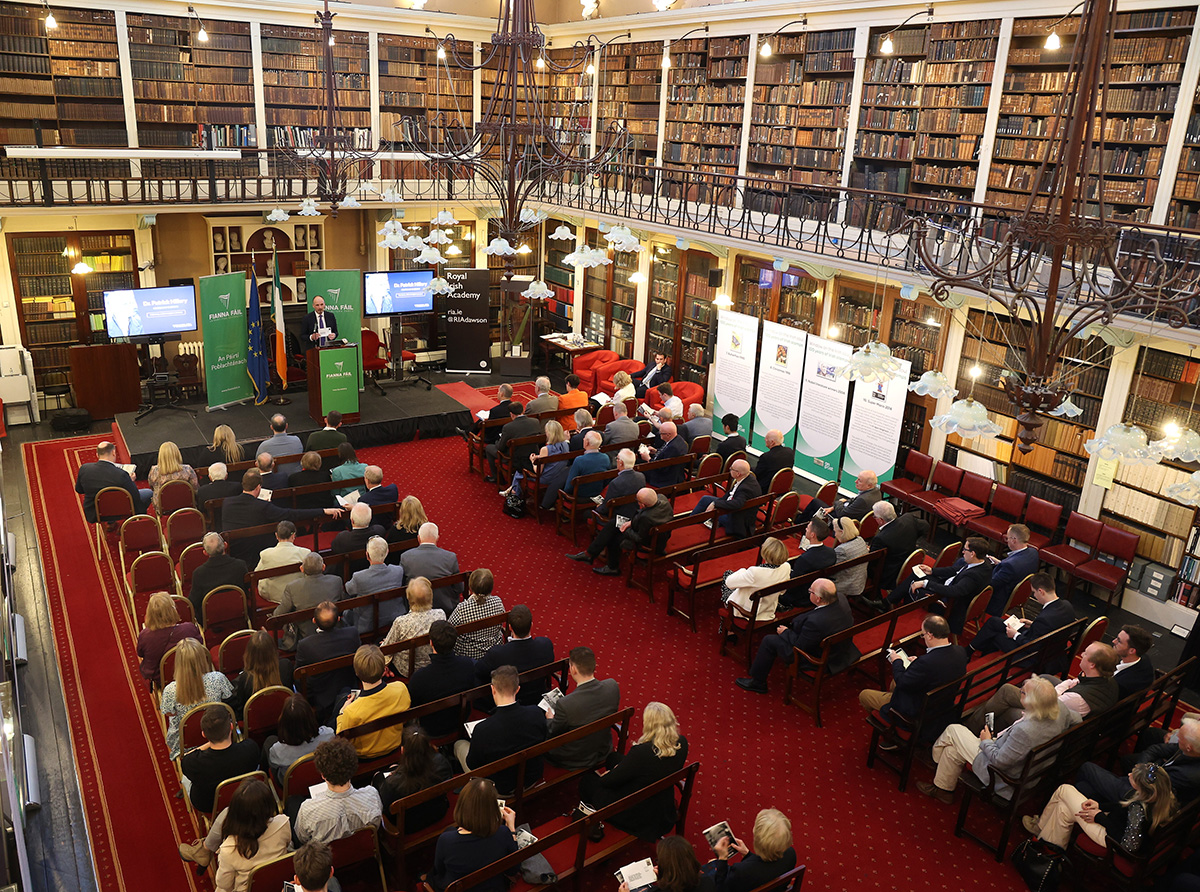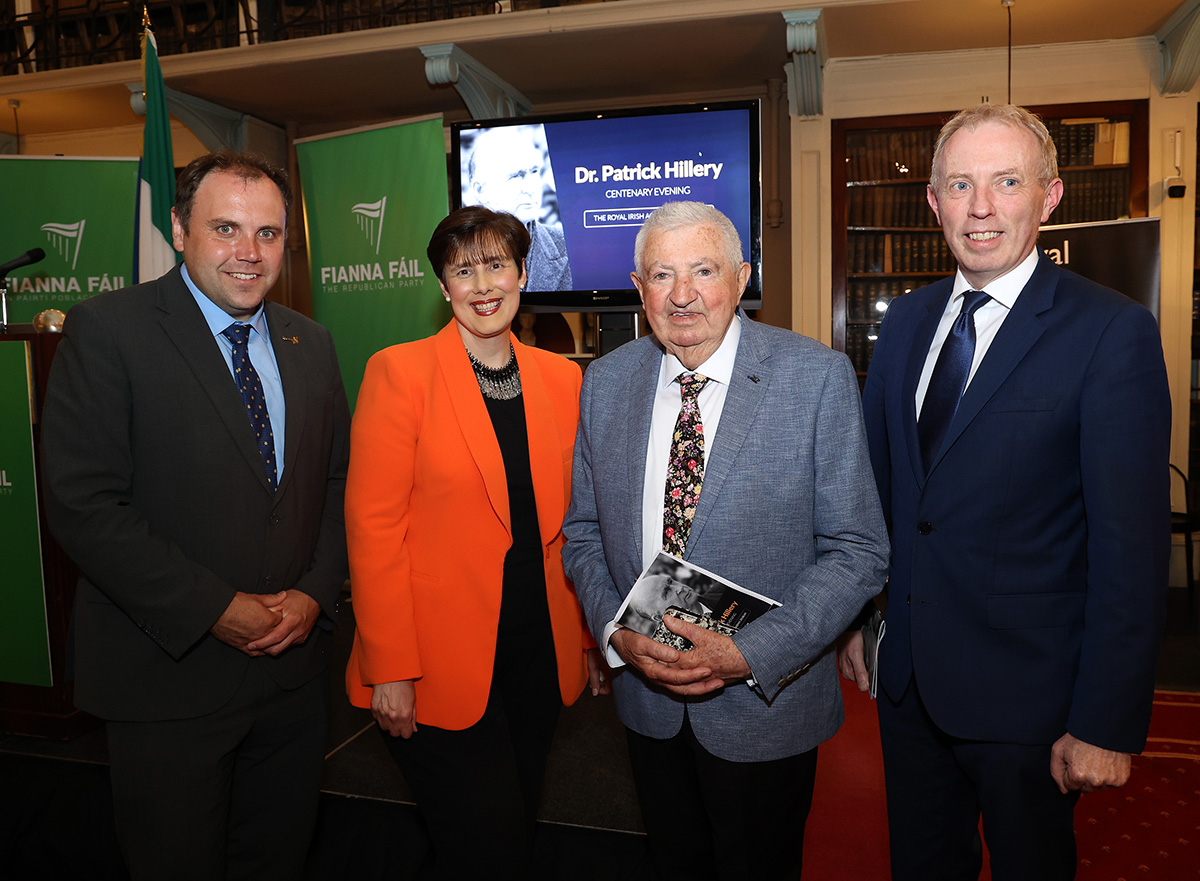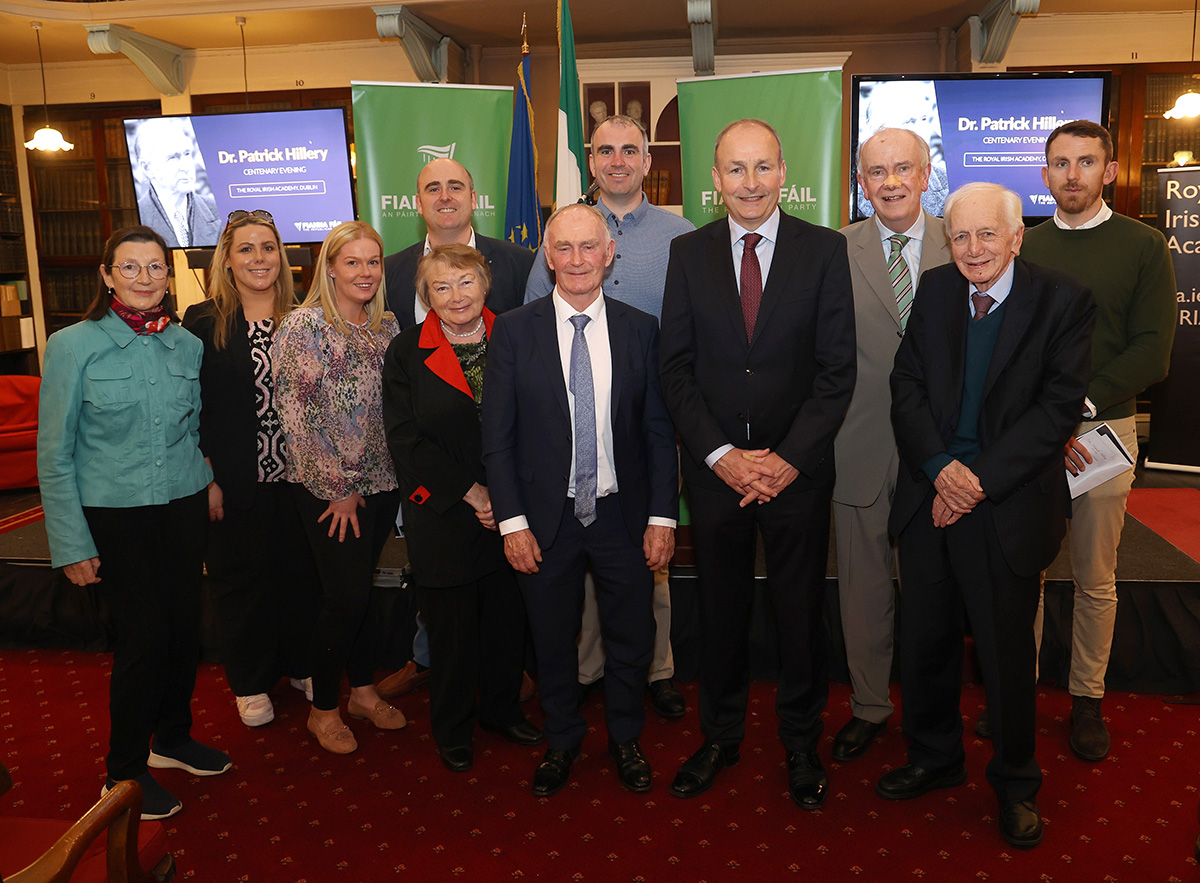Former President Patrick Hillery’s centenary has been commemorated at a special event in Dublin.
The event was hosted bt by Fianna Fáil at the Royal Irish Library, Dawson Street, Dublin.
In his speech, Tánaiste and Uachtaráin Fhianna Fáil Micheál Martin said: “Over recent years we have all participated in many occasions where we have remembered the great events and personalities who were central to securing our independence. We have remembered not just great heroism but also truly remarkable leadership which ensured that our young democracy reinforced its sovereignty, rejected extremism and overcame civil conflict.
Remembering and engaging with the foundations of our state is a duty which we are happy to fulfil and we will continue to do so.
However, it is important that we also make time to remember later generations of leaders who built on these foundations – the leaders who helped us to become a modern democracy which certainly has flaws but equally has achieved great sustained progress.
There is no doubt that Patrick J. Hillery deserves to be remembered with gratitude for everything he did for our country and for a record of achievement which is almost unmatched in terms of its practical impact in underpinning social and economic progress.
Born a hundred years ago this month, Paddy Hillery is one of the critical figures in the development of modern Ireland.
The fact that this is not more widely appreciated is a great shame because we have so much to learn from him. His personal decency, his quiet drive, his belief in putting substance before appearance, his absolute commitment to putting the common interest first are qualities which are as relevant as they have ever been.
Born in Miltown Malbay in May 1923, Paddy Hillery’s love for the landscape and communities of Clare never dimmed. It was amongst the people of Clare that he learned his values, and his early experiences shaped his drive for action in public life.
The son of two widely respected and liked community medical professionals, medicine always attracted him. He went to the local national school but understood that he was more fortunate than many of his classmates, and never lost his commitment to giving others the same opportunities as he received.
After he graduated from UCD Medical Faculty his intention was always to be a community GP.
He spent a short period as a locum and then applied for a position in Dublin in the largest hospital in the country for treating Tuberculosis. He went there because it was the early 1950s and he was excited about the possibilities which new antibiotics presented for tackling TB.
TB was then then one of the largest causes of death in the population, particularly amongst poorer communities.
He intended to take this knowledge and use it to help the people of his home county. And this he did, but only for a few years and in a part-time capacity because politics was to intervene.
The officer board of the Fianna Fáil Comháirle Dáil Ceantair in Clare was determined to introduce new blood onto the ticket. They wanted a candidate who would serve Clare well, make a national impact and be a fitting running-mate for our founder Eamon deValera.
Paddy Hillery had no political involvement up to that point. His family were republicans and strong supporters of Dev, but the approach from the Party was a huge surprise to the 28 year old doctor deep in his study of the treatment of TB.
Once he had been persuaded to run he was easily elected, reflecting both the high standing of the Hillery name and his reputation as a young man of great ability.
He was never an actively partisan figure, retaining the ability to win admirers across the political spectrum throughout his career. However, he was proud to carry the banner of Fianna Fáil and was always interested in supporting new voices and ideas.
In his period as a backbencher Paddy Hillery quickly became known for his mastery of detail and his support for modernisation, both in Fianna Fáil’s policies and in the work of government.
He turned down offers to be a parliamentary secretary, which was the name used by Ministers of State at the time.
He did this because he wanted to continue to be able to practice medicine, a profession he had a deep personal calling to. However he could not turn down the offer of the newly-appointed Taoiseach Seán Lemass to serve as Minister for Education.
Lemass was one of the greatest figures in our founding generation.
He had already achieved more in his life than others could dream of, but in 1959 he was a man with a mission to change the direction of his country and to create new economic and social possibilities.
For him, education was central to this and he wanted the most able and passionate Deputy to be in charge of what had always been seen as a quiet and conservative Department. Ireland gained a reforming minister without equal.
Paddy Hillery’s time as Minister for Education represented a dramatic break from past practice. In every element of the education system he put in train reforms which delivered radical progress which has opened up opportunities which have benefitted every part of our society.
Very soon after he took up office he used the first available opportunity to signal the new direction.
He had succeeded in getting through government the long-delayed project of moving UCD to its current Belfield campus, which was the first major investment in university education since independence.
To implement the decision, he was required to bring a minor and formal piece of legislation through the Oireachtas.
When he rose to speak in the Dáil nobody expected much, but soon they saw the scale of the ambition of the new minister, his government and his party.
Hillery started with an acknowledgement of the basic fact that Ireland was one of poorest countries in Europe with few resources available to it.
He acknowledged the sincerity and detail of the arguments of economists and many civil servants that expanding education places could be seen as training people for jobs which didn’t exist in Ireland.
He also accepted that the state’s role in education had been severely limited outside of primary schools and that others saw themselves as having a powerful voice.
He was careful to be fair to these arguments and to state that they were made by people who cared deeply about Ireland.
And he then went on to comprehensively reject these arguments for inaction and set a new path.
Paddy Hillery told the Dáil that only by investing in the skills and knowledge of its people could Ireland break the cycle of poverty.
To him the numbers who could complete secondary school and the numbers who could access higher education had to be expanded significantly. And to do this, new institutions, new funding and new curriculums would be required.
He summed it up in a phrase which deserves to be seen as one of the great rallying cries of modern Ireland: “If Ireland is to have a future it must have more education.”
It was a speech so comprehensive, so ambitious and so obviously central to the new government’s work that the opposition spokesperson, the famous orator James Dillon, was reduced to complaining that he couldn’t be expected to reply to a speech of such significance.
And in Hillery’s six years as Minister for Education he not only drove forward every idea he outlined in his first months, he went much further. He believed that every child should have the opportunity to attend school beyond compulsory education.
This required enormous preparation and tackling deeply entrenched interests quite apart from the potential cost. He was a young minister in a hurry but he was always committed to the policy first – and was prepared to undertake incredible complex manoeuvres.
Because of the tendency to minimise the role of politicians in progressive achievements, there are many who think that Ireland got free secondary education because the OECD told it to do it.
In fact, it was Paddy Hillery who asked the OECD to prepare a study on Irish education and he did so on condition that they had to recommend expanding secondary education.
He made it very clear to officials that this was part of the plan to implement the policy, it was not about creating a policy.
With Lemass’ strong support, in 1963 he laid out a number of policies intended to be the foundation for expanding educational access. He believed that the state had to break with the past and start taking the lead in establishing schools.
The proposal for creating comprehensive schools was not so much about making them the predominant model of provision, but establishing the principle that secondary education should be available in every community.
And with this he insisted on implementing a comprehensive curriculum – which meant that all communities should have access to the full curriculum, ending the division of communities between vocational and academic secondary education.
As expected, the hierarchy and religious orders opposed the proposal to expand provision, ensure a comprehensive curriculum and have state-funded facilities.
For a while it looked like there might be an attempt to make this a controversy on a level with the Mother & Child Scheme dispute of the early 1950s. However, Lemass and Hillery refused to budge and the policy went forward.
At the same time Hillery created the Commission on 3rd Level Provision – charging it with recommending an increase in both the number and types of higher education institutions.
Once again, it was about moving to implement his policies not about whether or not higher education should be expanded. Out of this work emerged the majority of the major higher education institutions in our country.
Historians of the period and of Irish education point to this plan as the turning point after which we began a journey to having one of the highest school completion and higher education completion rates in the world.
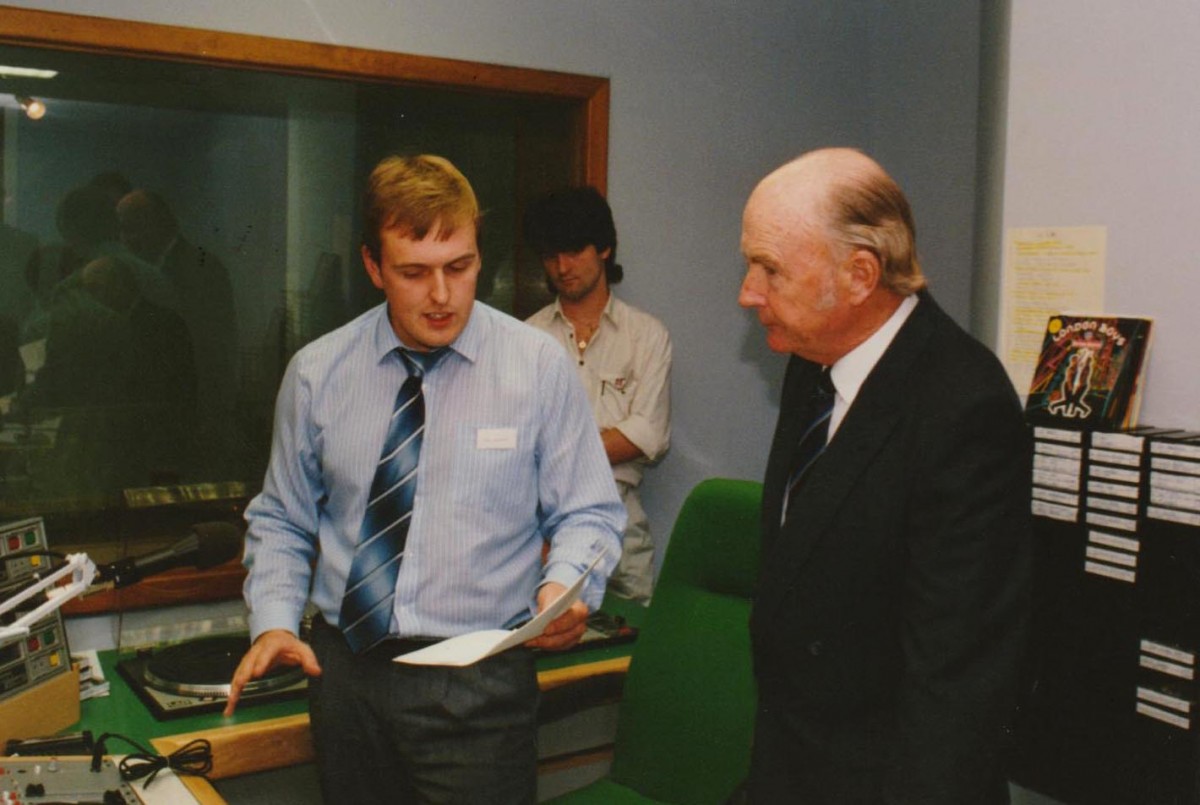
In later years Paddy Hillery was asked why he had been so committed to his reforms and why he was willing to break so many traditional policies.
He replied: “I got led into (the reform) by a social gap that I was conscious of, because I went to the national school at home. I was smart enough in school, but there were other lads as smart as me, but they didn’t get into secondary education. Then I was a doctor and I could see it. So you start off with a policy of giving opportunity.”
He left behind him a record in education which was true to this social vision – and it was a record which defined education policy in the decades which followed.
It is a policy which, to this day, is fundamental to the work of the Fianna Fáil party.
After nearly six years Lemass asked him to move first to Industry and Commerce and then to the newly re-established Department of Labour – in both cases it was because he wanted an energetic and creative minister to take the lead in addressing other priority challenges.
Lemass was opening Ireland to trading with the world and introducing tax policies to attract manufacturing investment.
This needed a new approach to supporting business and to making sure that training and work practices were in place to take advantage of these new, well-paid jobs.
Hillery again delivered and his standing was so high that he was approached about offering himself as a successor to Lemass. As always he put substance ahead of personal ambition, and was happy to serve under Jack Lynch and carry on with his ministerial reforms.
It was when he moved to the then Department of External Affairs that the next great theme of his career began – Ireland’s growth and progress as part of a strong European community of nations.
He personally oversaw and led our negotiations for membership of what we now call the European Union.
His professionalism and clarity led to Ireland securing the support of each of the members and an accession treaty which gave a lengthy transition period for key Irish industries.
In 1972 Ireland became the first country to hold a full national referendum before joining. Paddy Hillery led the campaign and was to the fore in making a positive case for membership as the fulfilment of Irish sovereignty – and facing down the arguments of the many who claimed national disaster would come if we voted Yes.
The iconic photograph of Hillery and Lynch signing our treaty of accession was the culmination of a dramatic period of reform and progress for Ireland – a period when Hillery had been an essential leader in government.
After 14 years in cabinet he became our first member of the European Commission. His decision to ask for the then relatively lowly-ranked portfolio of social affairs annoyed many back home, but it was a signal that he was going to Brussels to make an impact.
Social affairs had been an afterthought for Europe up to that point.
While the Council had suggested that a social programme be developed, there was no funding and no proposal when Hillery began his work.
In order to maximise his ability to talk personally with leaders, he improved his French and all business in his private office was conducted in that language.
Within three months he had developed and pushed through the Commission a proposal for widespread action on fields like equal pay, support for retraining the unemployed, programmes for people with disability and many other areas.
He then travelled through the nine member countries lobbying governments, employers and unions to support his package.
When a major economic crisis began due to conflict in the Middle East many predicted that the social policy measures were doomed – but it was the work of Paddy Hillery which made sure that his programme was formally adopted by all of the European institutions and he began implementation within one year of taking up office.
He is, in many ways, the father of modern European social policies.
Without his focus and skills there is almost no way that the first enlargement and the deep recession of the times would have left space for the incredibly significant social supports which have enabled Ireland and regions throughout Europe to develop.
And there is a very important point to seen in how he was viewed by the professional media and political class at the time.
The newspapers were regularly full of stories about how Hillery was supposedly not capable of getting his package prepared, adopted by the Commission, adopted by the Summit or funded by anyone. Every time he embarrassed those who briefed this nonsense.
While they were spending time spreading stories, he was doing the work of substance. He didn’t spend his time building his profile, he spent his time building his record.
The 1970s was a time of uncertainty in the development of Europe, but because of Paddy Hillery the European Union became a powerhouse in promoting equality and social supports.
When the Presidency became vacant he was an obvious and unanimous choice for nomination.
It was a difficult position for him to accept or to continue to hold because it took him away from the possibility of returning to medicine, something which he and Maeve had so often talked about.
And because he respected the constitutional position of the President he knew that he would not be able to be active in pushing and implementing many policies.
However he also understood that in this democratic republic, the position of head of state matters very deeply. The presidency is an institution which we can unite in our respect for and our pride for how they represent us to the world.
It is an institution which provides an essential reminder of the founding values of our state and our constitution. Paddy Hillery filled the role of President wonderfully – and brought honour to us through the dignity and humanity which defined his term.
As was the case through so much of his career, his focus was on the substance of his work and not on promoting himself.
In the campaign for choosing his successor, there were those who claimed that Áras an Úachtarán was inactive or irrelevant.
Perhaps the best refutation of this came from his successor Mary Robinson. Soon after taking up office, after she had been able to look in detail at the work of her predecessor, she said that she was amazed by the amount of work he had done, the number of organisations he had visited, the number of community events he had attended.
The programme of state visits which he undertook was far in excess of anything which had been seen before.
His was an active and inclusive presidency. With Maeve playing a vital role, his presidency was a source of stability in an often difficult period for our country.
When he left office he remained committed to the great causes of his life – the people of Clare, expanding educational opportunity and developing Ireland’s place in the European Union.
It was very fitting that his last public campaign was when he spoke about the importance of our decision to joint the now European Union during the Nice Referendum
I very much valued the opportunities I got to talk with him at events, where he was always generous with his time and his advice.
I particularly remember his encouraging words during my first year as Minister for Education when I met him at an event in Dublin Castle. He told me what a great job it was and to push on with the agenda I had recently outlined.
I would also like to acknowledge the Hillery family for the support which they gave Paddy and for their own service to our country. Maeve Hillery was a wonderful personality in her own right, who promoted our country wherever she travelled and provided essential support for Paddy.
During his second term in office, Maeve and Paddy suffered the loss of their daughter Vivienne, a burden which they bore with great strength and dignity.
Their son John has of course made many important contributions to public life, especially in his role as President of the College of Psychiatrists of Ireland.
Their nephew Brien, whose early political career Paddy did so much to encourage, has recently passed and was remembered with great fondness in tributes paid in the Dáil.
Paddy Hillery is, by any measure, one of the great figures of independent Ireland.
Through his decades of service he represented his community, his country and Europe with great dignity and dynamism.
He left behind him a record of achievement which has benefitted every generation which has followed. A record which has enabled historic and sustained economic and social progress.
On this centenary of his birth, it is right that we remember all that he did for us and say thank you to Paddy Hillery.”
